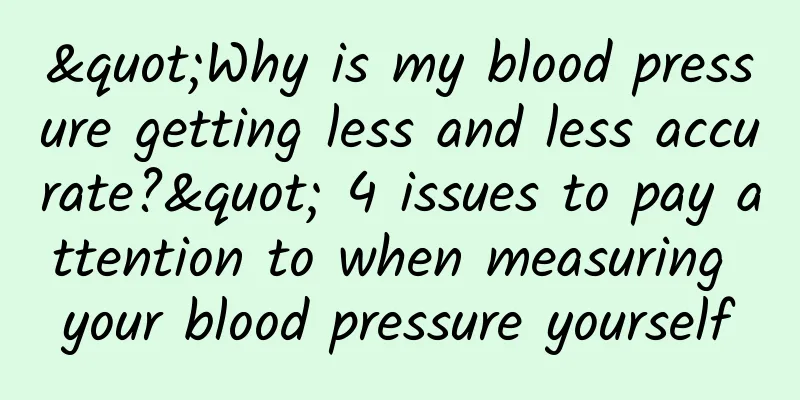What to do if you have spotting at 14 weeks of pregnancy

|
When a woman becomes pregnant, she will take extra care to take care of herself in life. Everyone's physical condition is different. Many people are not in good health due to physical factors. They must be very careful when they are pregnant. In the first three months of pregnancy, the fetus has not yet fully grown in the uterus, and this is when miscarriage is most likely to occur. If there is spotting in the first three months of pregnancy, it is best to go to the hospital for examination. What to do if you have spotting at 14 weeks of pregnancy 1. Miscarriage: Pregnant mothers should rush to the hospital immediately and continue with B-ultrasound examinations according to their personal conditions to understand the development of the fetus; if the amount of bleeding is heavy, it means that miscarriage is inevitable and a curettage is required in time; if the amount of bleeding is small, it may be a threatened miscarriage. Under the guidance of a doctor, the chances of successfully preserving the fetus are still very high if the woman undergoes conditioning and adequate rest. 2. Ectopic pregnancy: If there is vaginal bleeding and abdominal pain in the early stages of pregnancy, you should go to the hospital immediately, especially pregnant women with a history of ectopic pregnancy should be more careful. A careful B-ultrasound examination is performed in the early stages of pregnancy to determine whether the pregnancy is intrauterine. reason 1. Implantation bleeding. If you have just become pregnant, when the fertilized egg implants on the wall of the woman's uterus, you may have slight vaginal bleeding in the next 1-2 days, but at this stage it is difficult to know whether the vaginal bleeding is caused by pregnancy. 2. Miscarriage or ectopic pregnancy. Light bleeding or vaginal bleeding may be a sign of miscarriage or ectopic pregnancy, especially if it is accompanied by abdominal pain or cramping. 3. Infection. A small amount of vaginal bleeding may also be caused by vaginal infection or sexually transmitted infection, which can cause the vagina and cervix to become infected and inflamed. The inflamed tissue will cause a small amount of bleeding after a cervical smear test, vaginal examination or sexual intercourse. 4. Placental problems or premature birth. If a pregnant woman experiences vaginal bleeding or a small amount of bleeding during the second or third trimester, it may be a sign of a more serious condition. Such as placenta previa, placental abruption (the placenta separates from the uterine wall before the baby is delivered), late miscarriage (before 13 to 28 weeks of pregnancy), or premature birth (before 28 to 37 weeks of pregnancy). 5. Normal signs of delivery. In the late pregnancy, which is 37 weeks, if you find vaginal bleeding at this time, such as the leucorrhea is sticky and contains blood, it is usually a case of spotting and you should inform your doctor. |
<<: 40-year-old upper eyelid drooping
>>: I am 14 weeks pregnant, why am I still vomiting?
Recommend
What are the symptoms of cervical prolapse?
Many women often feel back pain, especially in th...
Hot compress for brown discharge after medical abortion
After an unexpected pregnancy, women will choose ...
Female left side waist pain
For most people, lower back pain may be caused by...
What should you pay attention to during painless repair?
Painless IUD insertion is a method of IUD inserti...
Can fennel dumplings reduce milk production?
Fennel is a food that we can all eat, but it is n...
Is it okay to donate blood during menstruation?
Everyone knows that women have menstruation every...
Why do I have uterine pain?
In daily life, women may often experience many sy...
Food Safety | @For those of you who love drinking coffee and cola, how much do you know about their "bones"?
Coffee and cola seem to have become the standard ...
Prostaglandins Dysmenorrhea
Women's menstruation is a very torturous phys...
Rumor debunked: If you eat “photosensitive foods”, your sun protection efforts may be in vain?
In the hot summer, sun protection has become a mu...
Pain in the upper left back of a woman
Modern women are under great pressure at work and...
Women should be alert to 6 types of vaginal bleeding
1. Inflammatory bleeding Vaginal bleeding caused ...
Abdominal pain after medical abortion
Medical abortion is a relatively common method of...
Can premature baldness in women be passed on to sons?
Many girls have experienced baldness in life. Bal...
Is it easy to have miscarriage when you just get pregnant?
Generally speaking, it is best not to walk around...









